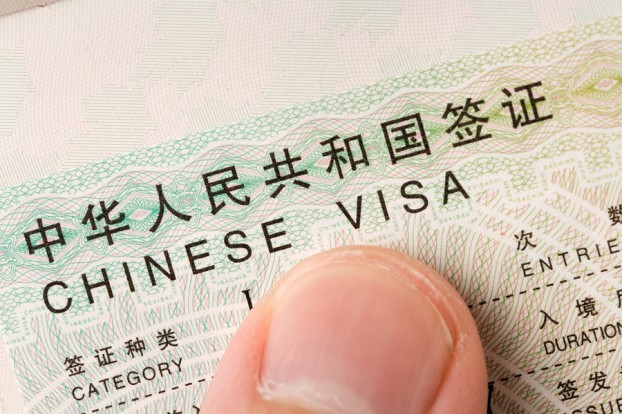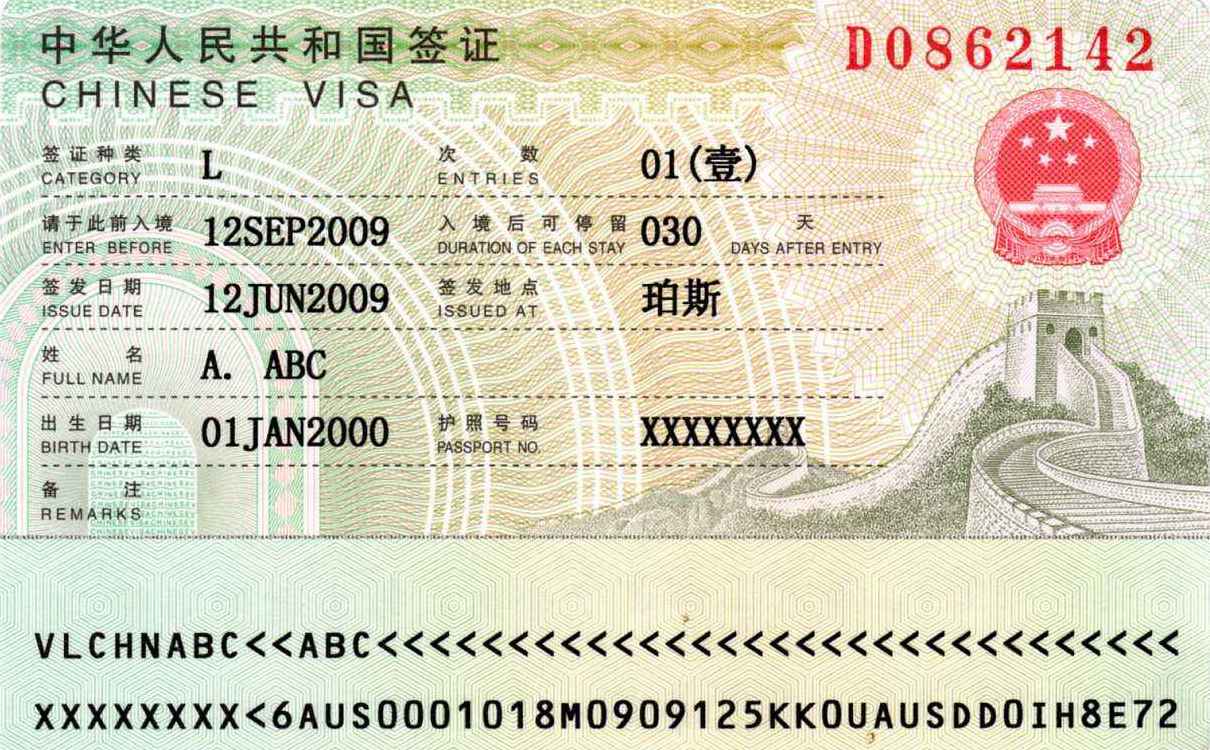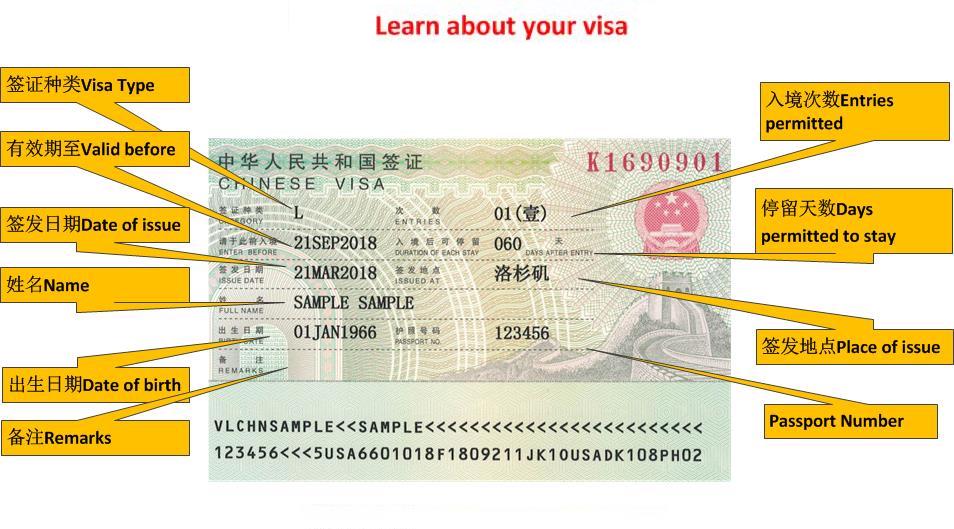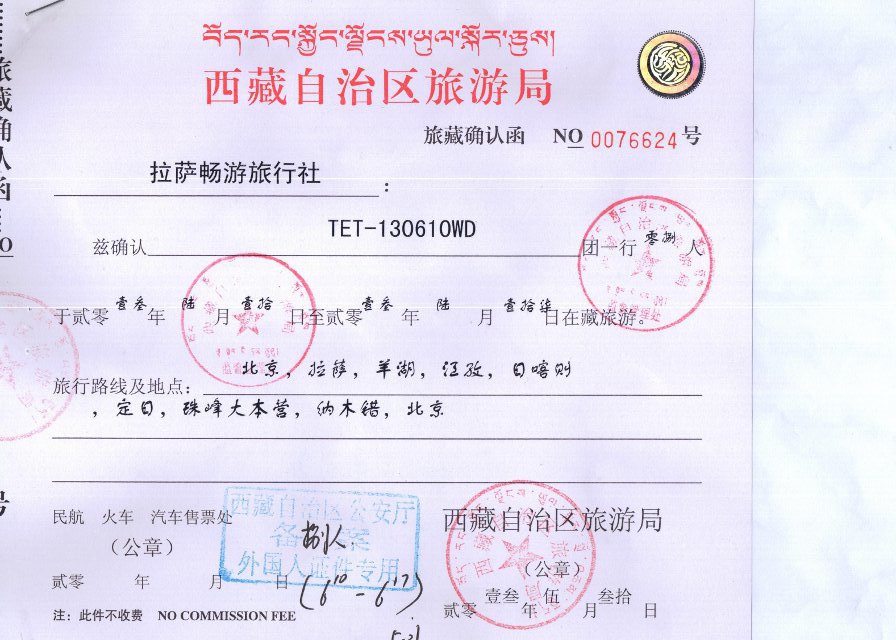China Visa and How to Apply for a China Visa
A China visa is an official travel document issued by government-authorized agencies of China to foreign citizens who wish to enter, exit, or transit through the country. It is granted in accordance with China's laws and regulations governing visa issuance.
In this article, we would like to share all the information about China Visa, including:
- Latest News related to China's Visa-free Policies
- Who needs China Visa?
- China Visa Types
- How to apply for a China Visa?
- When to apply for your China Tourist Visa?
- China Visa Entries / Validity / Duration of Stay
- Visa Policy for Hong Kong SAR and Macau SAR
- China Visa Renewal and Extension
- Apply a China Visa in Hong Kong
- Special Permits Required to Visit Tibet

1. Latest News about China's Visa-Free Policies
June 25, 2024:
- China's Foreign Ministry Spokesperson, Mao Ning, announced during a press briefing that from July 1, 2024, to December 31, 2025, citizens of New Zealand, Australia, and Poland holding ordinary passports will be permitted to enter and stay in China visa-free for up to 15 days for business, tourism, visiting relatives and friends, and transit.
May 31, 2024:
- China is set to extend visa-free travel for Malaysian tourists from 15 to 30 days, says Datuk Seri Dr Ahmad Zahid Hamidi.
May 13, 2024:
- Chinese President Xi Jinping during his first European tour after Pandemic announced that China will extend its visa exemption policy until the end of 2025 for citizens from 12 countries, 11 in Europe. The policy enables passport holders from France, Germany, Italy, the Netherlands, Spain, Switzerland, Ireland, Hungary, Austria, Belgium, Luxembourg and Malaysia to enter China visa-free for up to 15 days for business, tourism, visiting relatives and friends, and transit.
March 7, 2024:
- China is set to broaden its unilateral visa-free travel policy to include 6 additional European countries: Switzerland, Ireland, Hungary, Austria, Belgium, and Luxembourg. This expansion will be in effect from March 14 to November 30, 2024. Ordinary passport holders from these countries will have the opportunity to enter China without a visa for purposes such as business, tourism, visiting relatives and friends, or transit, for a period of up to 15 days.
On November 24, 2023:
- China expanded its 15-day visa-free travel policy to include five European countries—France, Germany, Italy, the Netherlands, Spain and Malaysia. This new policy, effective from December 1, 2023, to November 30, 2024, allows holders of ordinary passports from these nations to enter China without a visa for purposes such as business, tourism, visiting relatives and friends, and transit, for a duration not exceeding 15 days.
January 29, 2024:
- China and Thailand have officially agreed to implement a visa-free entry policy for their citizens, allowing stays of up to 30 days. Starting from March 1, 2024, individuals holding ordinary passports and traveling for tourism, family visits, or business purposes will benefit from this new agreement.
February 9, 2024:
- China and Singapore have officially agreed to implement a visa-free entry policy for their citizens, allowing stays of up to 30 days. Starting from February 9, individuals holding ordinary passports and traveling for tourism, family visits, or business purposes will benefit from this new agreement.
Nov. 24th 2023:
- Exciting news for citizens of France, Germany, Italy, the Netherlands, Spain, and Malaysia! China is temporarily exempting you from visas to boost post-pandemic tourism. From December 1st to November 30th 2024, enjoy visa-free entry for business, tourism, visiting relatives, or transit up to 15 days. Explore China's wonders hassle-free and experience its rich culture and breathtaking landscapes.
July 23th 2023:
- China will reinstate its 15-day visa-free entry for citizens of Singapore and Brunei from July 26, 2023, according to the embassies of both countries. This comes after a three-year suspension of visas as China adopted strict travel restrictions under its stringent zero-Covid policy, which ended in December last year.
2. Who needs China Visa?
If you possess an ordinary passport, you will need to apply for a visa to enter China unless you are eligible for China Visa Exemption & China's Visa-Free Policies. This policy includes various options such as the 24/72/144-hour visa-free transit schemes, Hainan 30-day visa-free access, visa exemption for tour groups meeting specific requirements, and visa-free entry for holders of APEC Business Travel Card. Moreover, nationals from countries that have mutual visa-exemption agreements with China, such as Singapore, Brunei and Japan (still suspended after Covid), can also enjoy visa-free entry to China up to 15 days for tourism, including visiting family or friends, or minor business purposes provided they enter through nominated international ports. Furthermore, individuals holding a Chinese Temporary Residence Permit do not need a visa to enter China as long as they stay within the validity period of their Residence Permit. You can read more information about China’s Visa-Free Policies.
3. China Visa Types
China offers a diverse range of visas tailored to meet the specific needs of foreign visitors. Generally there are 11 categories of China visa (L- travel, M-business, Z-working, X - Long-term student, F - Noncommercial Visit, Q- Family Reunion, S-Private Visit Visa, G - transit, C - flight attendant/Crew, J - journalist, D - resident ). For most travellers, the type of visa issued is an L visa - tourist visa. The letter specifying what type of visa you have is usually stamped on the visa itself.
-
Tourist Visa (L Visa): The Tourist Visa is designed for individuals who wish to explore the wonders of China for leisure, sightseeing, or to visit friends and family. With an L Visa, travelers can experience China's rich cultural heritage, iconic landmarks, and breathtaking landscapes.
-
Business Visa (M Visa): The Business Visa is ideal for foreign entrepreneurs, professionals, or representatives attending trade fairs, business conferences, or engaging in commercial activities in China. It facilitates collaboration, networking, and the exploration of China's rapidly growing market.
-
Work Visa (Z Visa): The Work Visa, also known as the Z Visa, is issued to those who intend to work in China. Whether it's teaching English, working in a multinational corporation, or contributing to the local economy, the Z Visa is the gateway to exciting career opportunities in China. Those people will also get a working permit while in China.
-
Long-term Student Visa (X Visa): It is issued to those who intend to study in China for a period of more than 180 days. This visa category is designed for international students who have been accepted by a Chinese educational institution to pursue academic studies, language courses, or research programs.
-
Noncommercial Visit (F Visa): The F Visa is a non-immigrant visa category issued by China to foreign nationals who intend to visit the country for non-commercial or non-profit activities. The F Visa is primarily intended for individuals participating in activities such as exchanges, visits, study tours, cultural events, academic programs, or conducting research in China.
-
Family Reunion Visa (Q Visa): It is issued to family members of Chinese citizens or foreigners with Chinese permanent residence who intend to visit China for the purpose of family reunion. The intended duration of stay in China for Q Visa holders exceeds 180 days.
-
Private Visit Visa (S Visa): The Private Visit Visa is issued to those who intend to visit foreigners working or studying in China, to whom they are spouses, parents, sons, or daughters under the age of 18, or parents-in-law. Additionally, it is also granted to those who plan to travel to China for other private affairs. The intended duration of stay in China for S Visa holders exceeds 180 days.
-
Transit Visa (G Visa): The Transit Visa (G Visa) caters to travelers who have a layover in China while en route to their final destination. It allows them to explore China briefly, adding an exciting dimension to their journey.
-
Crew Visa (C Visa): Vital for crew members of international transportation vehicles, such as airlines and ships, the Crew Visa ensures smooth operations and international cooperation in the realm of travel and trade.
-
Journalist Visa (J Visa): It is issued to news media personnel who intend to visit China for the purpose of news reporting. This visa category is specifically designed for journalists, reporters, and media professionals who plan to cover events, stories, or news in China.
-
Permanent Residence Visa (D Visa): It is issued to those who intend to reside in China permanently. This visa category is designed for foreign nationals who have been granted permanent residency status in China, indicating their long-term commitment to living and working in the country.

4. How to apply for a China Visa
To apply for a China visa, generally you need to complete an application form attached with your recently-taken color photo, prepare a valid passport, and submit them along with other supporting documents to China Visa Application Service Center, Chinese embassy or consulate which is in charge of your residence area.
Below is a general 10-step guideline on how to apply for a China visa:
Step 1: Check if you need a visa: Determine if you are eligible for China's visa-free policies. If not, you should still prepare some documents like your passport, inbound and outbound transportation tickets, and sometimes sufficient funds for the immigration check.
Step 2: Determine the visa type: Choose the appropriate visa type based on your purpose of visit (e.g., tourist, business, work, study). Each visa type has specific requirements and documentation
Step 3: Check visa requirements: Visit the Chinese embassy or consulate official website in your country for specific requirements and documents needed for your visa type. The requirements normally include a passport with validity of at least 6 months, a completed visa application form, passport-sized photos, and other supporting materials.
Step 4: Complete the visa application form: Download the form from the Chinese embassy or consulate website or obtain it from your China visa agent and and fill out it accurately. Ensure your passport is valid for at least 6 months with blank visa pages.
Step 5: Gather supporting documents: Collect all the required documents according to your visa type. For a tourist L visa, the supporting documents typically include round-trip flight tickets, hotel reservations, an invitation letter from your China travel agency, financial documents, etc.
Step 6: Make an appointment & submit your application: Schedule an appointment with the Chinese embassy, consulate, or Chinese Visa Application Center (CVASC) that is responsible for your residence area. Submit your completed visa application form and supporting documents at the designated time, either in person or through an authorized visa application center. In some cases, applicants aged 14-70 may need to appear in person, but you can authorize someone else to submit the application on your behalf in certain instances. Some consular offices and CVASCs may offer mail service for submission.
Step 7: Pay the visa fee: Pay the visa processing fee, which varies depending on your nationality, visa type, and processing time. Keep in mind that the visa fee is non-refundable, even if your application is rejected.
Step 8: Wait for processing: China visa processing time varies based on the visa type and application volume. On average, tourist visa processing takes about 4-5 business days. However, delays may occur due to application issues, high application volume, or Chinese public holidays. Expedited options may be available by paying an additional fee to process your application faster.
Step 9: Attend an interview (if required): In some cases, an interview may be required at the Chinese embassy or consulate during the visa application process. Be ready to discuss your travel plans and provide any requested information.
Step 10: Collect your visa: After approval, collect your visa from the Chinese embassy or consulate. Verify its validity and ensure all information is accurate.
Please keep in mind that visa requirements and procedures may change over time, so it's best to visit the official website of the Chinese embassy or consulate in your country for the most up-to-date and accurate information before applying.
5. When to apply for your China Tourist Visa?
The ideal time to apply for a China tourist visa is 1-2 months before your departure date. The China visa is typically valid for 3 months from the date of issue, so apply within that timeframe to ensure validity for your travel dates and allow enough processing time.

6. China Visa Entries / Validity / Duration of Stay
If you have a valid Chinese visa, you can enter China during its period of validity and stay for the permitted duration after each entry. It is crucial to carefully review the details of your visa, including the number of entries allowed, the validity period, and the duration of stay allowed after each entry.
Number of Entries: Single (01), Double (02) and Multiple (M)
A Single-Entry China Visa is typically valid for 3 months from the date of issue, and it allows you to stay in China for a maximum duration of 30 days. This visa is suitable for tourist purposes or general business activities. For most travelers, a single-entry visa is sufficient for their travel needs.
Double-Entry China Visa - It is required if you need to leave mainland China and then re-enter it. It allows you two entries into mainland China during its validity period. It's important to note that if you plan to travel from mainland China to Hong Kong or Macau and then return to mainland China, you will also need a double-entry visa. With a double-entry visa, you have the flexibility to leave and return to mainland China on two separate occasions during the visa's validity period.
Multiple-entry visa - It allows you to exit from mainland China and re-enter multiple times during its validity period. This means you can leave and return to mainland China on the same visa multiple times without the need to apply for a new visa each time. The multiple-entry visa provides flexibility for travelers who need to make multiple trips to and from mainland China within the visa's validity period.
After leaving mainland China, you need either another valid entry on your current visa or a new visa to return. Even a short visit to Hong Kong or Macau counts as an exit. Remember, you can't add entries to an issued visa; apply for a new one if needed. Plan your travel carefully to have the required entries and valid visas for your trips to and from mainland China.
China Visa Validity: 3 Months, 6 Months, 1 Year, 10 Years
The validity of a China visa is determined by the period between the "Issue Date" and "Enter Before" date stated on the visa. It typically ranges from 1 month, 3 months, 6 months, 1 year, and in some cases, even 10 years. Holders must pay attention to the "Enter Before" date and ensure they enter mainland China before 24:00 of that date. If they fail to enter before the specified time, the visa will expire, and it cannot be extended regardless of the remaining entries. In such a situation, reapplication for a new visa would be required.
The duration of each stay
The duration of each stay is specified on a China visa, indicating the maximum number of days the visa holder is allowed to stay in mainland China after each entry. This duration is counted from the day following the date of entry. It is essential for visa holders to adhere to this stipulated duration to comply with China's immigration regulations. Make sure to check your visa carefully to understand the permitted duration of each stay and plan your travel accordingly to avoid any issues with overstaying your visa.

7. Visa Policy for Hong Kong SAR & Macau SAR
Hong Kong SAR & Macau SAR operates under their own entry regulations as Special Administrative Regions (SAR) of China, and the standard Chinese visa is not applicable for entry to Hong Kong & Macau, and vice versa.
Hong Kong Visa Policy:
The Hong Kong entry rules are similar to those under British administration before the SAR's return to Chinese control.
For short stays, Hong Kong allows visa-free entry to citizens of over 160 countries, with the duration varying from 7 to 180 days depending on their nationality. These travelers are granted entry as visitors without the need for a visa. British nationals can stay for up to 180 days without a visa, while citizens from the USA, Canada, Australia, New Zealand, and most European countries can stay for 90 days. Other nationalities have varying restrictions ranging from 30 to 7 days.
Tourists visiting for business activities, such as meeting clients or attending trade fairs, are welcome without a visa. However, a Hong Kong visa is required for work, study, business activities beyond the granted visa-free period, or for citizens of certain countries that don't qualify for visa-free entry. Please note that there is no arrival visa option for Hong Kong.
Visitors can usually take a ferry to Macau and then re-enter Hong Kong without any issues, except if they are engaged in business activities. Indian nationals need to register online before visiting Hong Kong visa-free. If you're on a direct air transit without leaving the airport, registration is not required.
Please check the complete information on the website of the HK Immigration Department website.
Macau Visa Policy:
Macau offers visa-free entry to citizens of 81 countries, welcoming tourists and short-term business visitors. These countries include most European nations, the USA, Canada, Australia, New Zealand, and many others. Depending on their nationality, visitors can stay in Macau for periods ranging from 7 to 180 days without needing a visa. For certain countries, citizens may be eligible for a Visa-upon-arrival, also known as an 'Entry Permit,' which allows them to obtain a visa upon arriving at Macau's border control. The visa costs MOPD 200 per adult, MOPD 100 per child under 12, and MOPD 400 per family, and it permits a maximum stay of 30 days once the application is approved. However, visitors from Bangladesh, Nepal, Nigeria, Pakistan, Sri Lanka, Vietnam, and some other specific countries are required to apply for a Macao visa in advance through a Chinese embassy or consulate before their travel to Macau.
A more detailed information, please check the web page of Immigration Clearance of Non-residents of Macao.
8. China Visa Renewal and Extension
If your visa in China is nearing its expiration, you have two options if you wish to stay longer than the authorized period. You can either leave the country or apply for a visa extension. To extend your stay, you must visit the Exit & Entry Administration Office of the Public Security Bureau (PSB or Gong'anju) where you are currently residing, and do so at least 7 days before your visa expires.
Getting a first-time extension of 30 days on a single-entry tourist visa is relatively straightforward. However, obtaining further extensions can be more challenging and may only grant you an additional week. PSB offices outside of Beijing might be more lenient in offering further extensions, but it's not guaranteed.
Certain documents are required for the visa extension, which includes a valid passport, a recent passport-style photo, a registration form of temporary residence, and proof of reasons for the extension or renewal, such as a travel itinerary for tourist visa extensions. You need submit the application in person to the PSB Exit and Entry Administration office.
For citizens of most countries, the fee for a visa extension in China is CNY 160. However, the fee may vary for citizens of certain countries. For instance, US citizens are required to pay CNY 760 for an extension, while UK citizens need to pay CNY 469. The processing time for a visa extension can take up to three to five days.
The duration of the extension can differ from city to town. Travelers have reported that provincial towns and less populated areas may be more generous in granting extensions on the spot. If you have exhausted all extension options, going to Hong Kong to apply for a new tourist visa is a reliable alternative.
Overstaying your visa in China can result in a penalty of up to Y 500 per day. Some travelers have faced issues with officials misinterpreting the 'valid until' date on their visa. For a one-month tourist (L) visa, the 'valid until' date refers to the deadline for entering the country (within three months of the visa's issue date), not the date when the visa expires. Your visa remains valid for the number of days specified after the date of your entry into China.
9. Apply a China Visa in Hong Kong
Hong Kong is an ideal place to apply for a China visa if you are unable to do so in your home country. It is also a convenient option for extending your China visa while living in China, as Hong Kong is considered foreign territory and falls under the category of 'third regions'.
There are two main methods to apply for a China visa in Hong Kong: applying in person at the China Visa Office in Hong Kong or using an agent. Applying in person is more cost-effective but requires more effort, while using an agent is more convenient but comes with a higher cost.
If you choose to apply in person, you will need to submit your application at the Chinese Visa Office in Hong Kong. The required documents include:
- A valid passport with at least six months of remaining validity and a photocopy of the passport's data page and the photo page if it is separate.
- If you are a Hong Kong resident, provide your Hong Kong ID card.
If you are a non-permanent resident, you will need to submit documents supporting your residence status (e.g., residence, employment, or student status) along with their original and photocopy.
If you are a visitor, you need to have a copy of the Hong Kong entry stamp (Landing Slip) on your passport or a valid Hong Kong visa. - A visa application form. Applicants should complete the application form on the website of the China Visa Application Service Center, print it out, and sign it.
- A passport-size photo.
- Supporting documents: Provide documents that demonstrate your travel purpose, such as a travel itinerary, round-trip transportation tickets, hotel reservations, or an invitation letter from your friends, family, or travel agency.
It is recommended that you make an appointment on the website of the China Visa Application Service Center and submit your application at the designated time. The processing time usually takes about 2-4 working days, depending on the service you choose.
After approval, you will need to pay the fee and collect your visa on the date shown on the pick-up slip.
If you prefer to use a travel agency to handle your China visa application in Hong Kong, we recommend the China Travel Service (CTS) and Forever Bright.
Here is the information for the Chinese Visa Application Service Center in Hong Kong:
Address: 20/F, Capital Center, 151 Gloucester Road, Wan Chai, Hong Kong
Telephone: (852) 29921999
Email: hongkongcenter@visaforchina.org
Website: https://www.visaforchina.cn/HKG2_EN/index.shtml
Business hours: Monday-Friday (Except holidays) 09:00-12:00, 13:00-16:00
Submission of applications and Payment: 9:00 to 16:00
For express level 1 service (pick-up on the second working day), the application should be submitted before 13:00. Collection hours: Express Service 12:00 to 16:00, and Regular Service 10:00 to 16:00.
The Visa Centre accepts cash and debit cards.
10. Special Permits Required to Visit Tibet
Independent travel for foreign tourists is not permitted in Tibet. All visitors must travel as part of an organized group organized by a travel agency. To enter and tour Tibet, foreign tourists are required to obtain specific permits on top of their China Visa, including the TTB permit, PSB permit, military permit, and others, just depending on where you will travel in Tibet.
WindhorseTour specializes in operating various tours in Tibet and assists tourists in obtaining the necessary permits. To ensure a smooth process, it is advisable for clients to confirm their Tibet tour one month in advance. To apply for the Tibet permit, travelers need to provide copies of their passports, China visa, and, if applicable, their working permit or student card if studying or working in China. The permit application typically takes around 7-15 working days to process.
You can read more about Tibet Permit and How to Get the Tibet Travel Permit.
Notably, a double entry China visa is not required to visit Tibet since Tibet is part of China.























Comments
Hi,
I was wondering if you could help me;
I'm underway planning a rather spontaneous trip to Nepal, which involves around 4/5 days in Tibet for sightseeing. I have only just realized the different visa requirements between Nepal and China, as i stupidly assumed it would be the same visa-on-entry situation.
My arrival to Lhasa is hopefully on 10.12.15, I have a South African Passport, traveling with a British Passport holder.
Look forward to hearing from you!
In reply to Chinese Visa and Tibetan Permit by Kate B (not verified)
Hello Kate,
Thanks for your comment! Overseas travelers must apply Tibet Permit to enter Tibet, our agency will help you to organize all of your Tibet permits. If you enter Tibet from Nepal side, then you don't need apply for any individual China tourist visa in advance but our agency arranges you a Group China Visa in Chinese embassy in Kathmandu, the application takes 2-4 days just depending on your choice. So you need prepare to have several days in Kathmandu before the tour starts.
I have sent you all the details via E-mail, please kindly have a look and feel free to contact me for any further information.
Best Regards,
Yuki
Hi,
Can you please clarify the process.
We apply in South Africa for our Chinese Visa with our full itinerary which includes the portion that we will go to Lhasa. We get those visa's back after about a week.
Then we send photocopies of these visa's ????? to our travel agent in China, and they submit the application on our behalf for the Tibet visa.
When we then arrive in Beijing - we have to give the tour operator our passports to take to the TIbet visa office, to get the Tinet visa put in it too. This will mean that we will be without our passports for 3 working days in Beijing???
Is this correct?
Is not - please explain how it will work, and how long do we have to stay in Beijing, before we can fly to Lhasa?
Thanks
Melodie
In reply to Tibet Visa by Mel (not verified)
Hi Melodie,
Thanks for contacting us. I totally understand your concerns and confusion, lots of people have the same questions about the policies. I've sent you an email with detailed explanation and some suggestions, hope that's helpful and please let me know if you have any further question on it!
I'm looking forward to hearing from you again!
Kind Regards,
Murphy